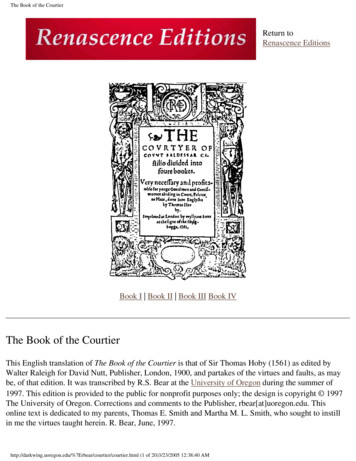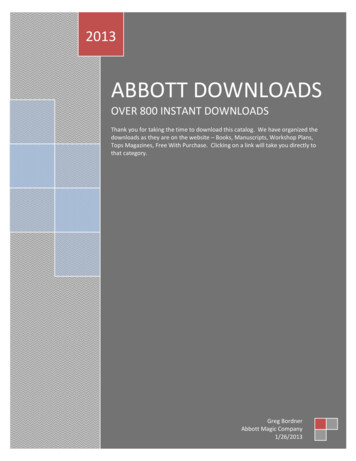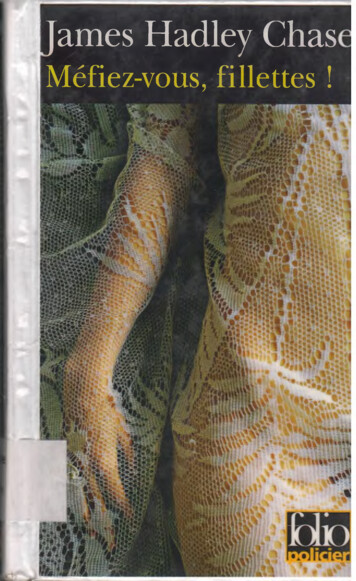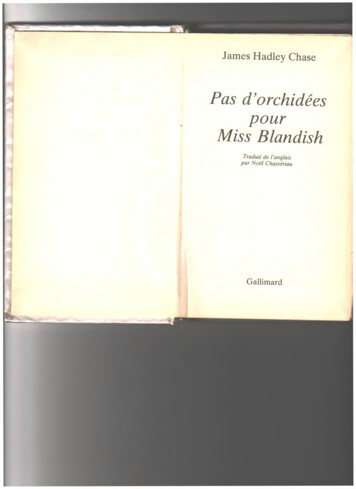
Transcription
The Book of the CourtierReturn toRenascence EditionsBook I Book II Book III Book IVThe Book of the CourtierThis English translation of The Book of the Courtier is that of Sir Thomas Hoby (1561) as edited byWalter Raleigh for David Nutt, Publisher, London, 1900, and partakes of the virtues and faults, as maybe, of that edition. It was transcribed by R.S. Bear at the University of Oregon during the summer of1997. This edition is provided to the public for nonprofit purposes only; the design is copyright 1997The University of Oregon. Corrections and comments to the Publisher, rbear[at]uoregon.edu. Thisonline text is dedicated to my parents, Thomas E. Smith and Martha M. L. Smith, who sought to instillin me the virtues taught herein. R. Bear, June, /courtier.html (1 of 20)3/23/2005 12:38:40 AM
The Book of the CourtierLinks: The printer to the reader. Commendation of the worke. The epistle of the Translator. A letter of Syr J. Cheekes. The epistle of the Author. The First Booke of the Courtyer. The Second Booke of the Courtyer. The Third Booke of the Courtyer. The Fourth Booke of the Courtyer. A letter that the Author writt to the Lady Victoria Columna Marquess of Pescara, whomhe mentioneth in the Epistle before his booke. A brief rehersall of the chiefe conditions and qualities in a Courtier. Of the chief conditions and qualityes in a wayting gentylwoman.THECOURTYER OFCOUNT BALDESSAR ourtier.html (2 of 20)3/23/2005 12:38:40 AM
The Book of the Courtierstilio divided intofoure bookes.Very necessary and profitatable for yonge Gentilmen and Gentilwomen abiding in Court, Palaiceor Place, done into Englysheby Thomas Hoby.Imprinted at London by wyllyam Seresat the signe of the Hedghogge, 1561.THE CONTENTES OF THE BOOKEThe first booke, entreateth of the perfect qualities of a Courtier.The second, of the use of them, and of merie Jestes and Pranckes.The thirde, of the condicions and qualities of a waytinge Gentillwoman.The fourth, of the end of a Courtier, and of honest love.THE PRINTER TO THE READERgreetyng.NOWE at the length (gentle reader) through the diligence of Maister Hoby in penninge, andmine in printing, thou hast here set forth unto thee, the booke of the Courtier: which for thybenefite had bene done longe since, but that there were certain places in it whiche of late yearesbeeing misliked of some, that had the perusing of it (with what reason judge thou) the Authourthought it much better to keepe it in darknes a while, then to put it in light unperfect and inpeecemeale to serve the time. Use it therfore, and so peruse it, that for thy profite, first he, andthen I, maye thinke our travayle herein wel tier/courtier.html (3 of 20)3/23/2005 12:38:40 AM
The Book of the CourtierFare well.THOMAS SACKEVYLLEin commendation of the worke.To the Reader.These royall kinges, that reare up to the skyeTheir Palaice tops, and decke them all with gold:With rare and curious woorkes they feed the eye:And showe what riches here great Princes hold.A rarer work and richer far in worth,Castilios hand presenteth here to the,No proud ne golden Court doth he set furthBut what in Court a Courtier ought to be.The Prince he raiseth houge and mightie walles,Castilio frames a wight of noble fame:The kinge with gorgeous Tyssue claddes his halles,The Count with golden vertue deckes the same,Whos passing skill lo Hobbies pen displaiseTo Brittain folk, a work of worthy praise.TO THE RIGHT HONORABLETHE LORD HENRY HASTINGESsonne and heire apparant to the nobleErle of Huntyngton.THEMISTOCLES the noble Athenien in his banishement entertayned moste honourablie withthe king of Persia, willed upon a time to tell his cause by a spokesman, compared it to a piece oftapistrie, that beyng spred abrode, discloseth the beautie of the wookemanship, but fouldedtogether, hideth it, and therefore demaunded respite to learne the Persian tunge to tell his ownecause: Right so (honorable Lorde) this Courtier hath long straid about this realme, and the fruiteof him either little, or unperfectly received to the commune benefite: for either men skilful in histunge have delited in him for their owne private commoditie, or elles he hath eftsones spoken inpeecemeale by an interpreter to suche as desired to knowe his mynde, and to practise hisprinciples: the which how unperfect a thing it is, Themystocles and experience teache. But nowe,though late in deede, yet for al that at length, beside his three principal languages, in the which hehath a long tyme haunted all the Courtes of Christendome, hee is become an Englishman er/courtier.html (4 of 20)3/23/2005 12:38:40 AM
The Book of the Courtiermany a longe tyme have wyshed, but fewe attempted and none atchieved) and wel-wiling todwell in the Court of Englande, and in plight to tel his own cause. In whose commendation I shallnot neede to use any long processe of woordes, for he can so well speak for himself, and answereto the opinion men have a long time conceived of him, that whatsoever I shoulde write therein,were but labour in waste, and rather a diminishing, then a setting foorth of his woorthinesse, anda great deale better it were to passe it over with silence, then to use briefenesse. Onely for the litleacquaintaunce I have with him, and for the general profit is in him, my desier is he shold nowe athis firste arrivall, a newe man in this kinde of trade, be well entertained and muche honoured.And forsomuche as none, but a noble yonge Gentleman, and trayned up all his life time in Court,and of worthie qualities, is meete to receive and entertaine so worthy a Courtier, that like mayefelowship and gete estimation with his like, I do dedicate him unto your good lordeship, thatthrough your meanes, and under your patronage he maye be commune to a greate meany. Andthis do I not, for that I suppose you stande in neede of any of his instructions, but partly becauseyou may see him confirme with reason the Courtly facions, comely exercises, and noble vertues,that unawares have from time to time crept in to you, and already with practise and learning takencustome in you: and partly to get him the more aucthoritie and credite throughe so honorable aPatrone. For no doubt, if you beseene willingly to embrace him, other yonge and CourtlyGentlemen will not shonn hys company: and so both he shall gete him the reputation now here inEnglande which he hath a good while since beyond the sea, in Italy, Spaine and Fraunce, and Ishal thinke my smal travayle wel imployed and sufficiently recompensed. The honour andentertainmnet that your noble Auncestours shewed Castilio the maker, whan he was in thisrealme to be installed knight of the Order for the Duke his Maister, was not so muche aspresently both he, and this his handywoorke shall receive of you. Generally ought this to be inestimation with all degrees of men: for to Princes and Greate men, it is a rule to rule themselvesthat rule others, and one of the bookes that a noble Philosopher exhorted a certaine kyng toprovide him, and diligently to searche, for in them he shoulde finde written suche matters, thatfriendes durst not utter unto kinges: To men growen in yeres, a pathway to the behoulding andmusing of the minde, and to whatsoever elles is meete for that age: To yonge Gentlemen, anencouraging to garnishe their minde with morall vertues, and their bodye with comely exercises,and both the one and the other with honest qualities to attaine unto their noble ende: To Ladyesand Gentlewomen, a mirrour to decke and trimme themselves with vertuous condicions, comelybehaviours and honest enterteinment toward al men: And to them all in general, a storehouse ofmost necessary implements for the conversacion, use, and training up of mans life with Courtlydemeaners. Were it not that the auncientnesse of tyme, the degree of a Consul, and the eloquenceof Latin stile in these our daies beare a greate stroke, I knowe not whether in the invention anddisposition of the matter, as Castilio hath folowed Cicero, and applyed to his purpose sundryeexamples and pithie sentences out of him, so hee maye in feate conveyaunce and lyke trade ofwriting, be compared to him: but well I wotte for renowme among the Italians, he is not inferiourto him. Cicero an excellent Oratour, in three bookes of an Oratour unto his brother, facionethsuch a one as never was, nor yet is like to be: Castilio an excellent Courtier, in thre bookes of aCourtyer unto his deere friende, facioneth such a one as is harde to finde and perhappesunpossible. Cicero bringeth in to dispute of an Oratour, Crassus, Scevola, Antonius, Cotta,Sultitius, Catulus, and Cesar his brother, the noblest and chiefest Oratours in those dayes: ier/courtier.html (5 of 20)3/23/2005 12:38:40 AM
The Book of the Courtierto reason of a Courtier, the Lorde Octavian Fregoso, Syr Fridericke his brother, the Lorde Juliande Medicis, the L. Cesar Gonzaga, the L. Francescomaria Della Roveré, Count Lewis of Canossa,the L. Gaspar Pallavicin, Bembo, Bibiena, and other most excellent Courtiers, and of the noblestfamilies in these dayes in Italy, whiche all afterwarde became Princes, Cardinalles, Bishoppesand greate Lordes, and some yet in lyfe. Both Cicero and Castilio professe, they folowe not anycertayne appointed order of preceptes or rules, as is used in the instruction of youth, but call torehearsall, matters debated in their times too and fro in the disputacion of most eloquent men andexcellent wittes in every woorthy qualitie, the one company in the olde tyme assembled inTusculane, and the other of late yeeres in the newe Palaice of Urbin. Where many most excellentwittes in this realme have made no lesse of this boke, then the Great Alexander did of Homer, Icannot sifficiently wonder that they have not all this while from tyme to tyme done a communebenefite to profite others as well as themselves. In this pointe (I knowe not by what destinye)Englishmen are muche inferiour to well most all other Nations: for where they set their delite andbend themselves with an honest strife of matching others, to tourne into their mother tunge, notonely the wittie writinges of other languages, but also of all the Philosophers, and all Sciencesboth Greeke and Latin, our men weene it sufficient to have a perfecte knowledge, to no otherende, but to profite themselves, and (as it were) after muche paynes in breaking up a gap, bestowno lesse to close it up againe, that others maye with like travaile folowe after. And where ourlearned menne for the moste part holde opinion, to have the sciences in the mother tunge, hurtethmemorie and hindreth lerning, in my opinion, they do full yll consider from whence the Greciansfirst, and afterwarde the Latins fet their knowledge. And without wading to any farther reasonsthat might be alleaged, yf they will marke well the trueth, they shall see at this daye, where theSciences are most tourned into the vulgar tunge, there are best learned men, and comparing itwyth the contrarie, they shall also finde the effectes contrarie. In Italye (where the mosttranslation of authors is) not onely for Philosophy, Logike, Humanitie and all liberall Sciencesbothe in Greeke and Latine (leaving a parte Barbarus, Naugerius, Sannazarus, Bembus, Lazarusand the rest that of very late dayes floryshed) Genua, Tomitanus, Robertellus, Manutius,Piccolhomineus, are presently very singular, and renowmed throughout all Christendome: butalso for the same in the vulgar tunge with litle or no sight at al in the Latin, Aretino, Gelli (atayler in Florence) the L. Victoria Columna, the L. Dionora Sanseverina, the L. BeatriceLoffreda, Veronica Gambera, Virginea Salvi and infinite other men and women are mostefamous thoroughout Italy, whose divine woorkes and excellent stile bothe in rime and prose gevea sufficient testimonye, not onely of their profounde knowledge and noble wit, but also thatknowledge may be obtained in studying onely a mannes owne native tunge. So that to be skilfulland exercised in authours translated, is no lesse to be called learning, then in the very same in theLatin or Greeke tunge. Therefore the translation of Latin or Greeke authours, doeth not onely nothinder learning, but it furthereth it, yea it is learning it self, and a great staye to youth, and thenoble ende to the whiche they oughte to applie their wittes, that with diligence and studye haveattained a perfect understanding, to open a gap for others to folow their steppes, and a vertuousexercise fo the unlatined to come by learning, and to fill their minde with the morall vertues, andtheir body with civyll condicions, that they maye bothe talke freely in all company, live uprightlythough there were no lawes, and be in a readinesse against all kinde of worldlye chaunces thathappen, whiche is the profite that commeth of Philosophy. And he said wel that was asked ourtier.html (6 of 20)3/23/2005 12:38:40 AM
The Book of the Courtierquestion, How much the learned differed from the unlearned. 'So much' (quoth he) 'as the welbroken and ready horses, from the unbroken.' wherfore I wote not how our learned men in thiscase can avoide the saying of Isocrates, to one that amonge soundrye learned discourses at Tablespake never a woorde: 'Yf thou bee unlearned, thou dooest wiselye: but yf thou bee learned,unwyselye,' as who should saye, learnyng is yll bestowed where others bee not profited by it. As Itherefore have to my smal skil bestowed some labour about this piece of woorke, even so couldeI wishe with al my hart, profounde learned men in the Greeke and Latin shoulde make the lykeproofe, and everye manne store the tunge accordinge to hys knowledge and delite above othermen, in some piece of learnynge, that we alone of the worlde maye not bee styll countedbarbarous in our tunge, as in time out of minde we have bene in our maners. And so shall weperchaunce in time become as famous in Englande, as the learned men of other nations have benand presently are. And though the hardnesse of this present matter be suche, and myneunskylfulnesse to undertake this enterprise so greate, that I myghte with good cause havedespaired to bringe to an ende it, that manye excellente wittes have attempted, yet coulde I notchouse but yelde to the continual requestes and often perswasions of many yong gentlemen,which have may chaunce an opinion that to be in me, that is not in deed, and unto whom in anyreasonable matter I were skilfull in, neyther I coulde nor ought of duetie to wante in fulfillyngtheir desire. Notwithsatnding a great while I forbare and lingered the time to see if anye of a moreperfect understanding in the tunge, and better practised in the matter of the booke (of whom wewant not a number in this realm) woulde take the matter in hande, to do his countrey so great abenefite: and this imagination prevailed in me a long space after my duetie done in translating thethirde booke (that entreteth of a Gentlewoman of the Courte) perswaded therto, in that I wasenfourmed, it was as then in some forwardness by an other, whise wit and stile was greatly to beallowed, but sins prevented by death he could not finish it. But of late beeyng instantly cravedupon a fresh, I whetted my stile and settled my self to take in hand the other three bookes (thatentreat of the perfection of a Gentilman of the Court) to fulfill their peticion in what I am able,having time and leyser therto, the which I have done, though not in effect, yet in apparance andthat in a great deale shorter time, then the hardnesse of the matter required. And where it shall notperhappes throughly please by reason my smalle understandyng in the tung, and less practise inthe matters herin conteined, is not of force to give it the brightness and full perfection in this ourtung that it hath in the Italian, it shal suffice yet that I have showed my self obedient in therespect a manne ought to have toward his betters[. A]nd no more can they avoid the blame tocharge me withall, then I to undertake it. Besides that, I have declared my good will and wellmeaning no less then if my counning were greater, and could extend much farther. Butparaventure the rudeness of this shall be an enouragyng of some other to give the onsett uponother matters with a better ripeness of style and much more aptness, and so shall this yetsomewhat profite both wayes. But the estimation it must gete by your Honour, is the principallcause that setteth it out, and maketh it worne with the handes of heedfull readers: for in case youcheerfullye receive it, men will recken it good: yf you alow it, worthy to be practised: yf youcommend it, woorthie to pass from hand to hand. Therfore emong the other good opinions mengenerally houlde of you, let it not be the least, that they may houlde also no less of this that youalowe and commende. And so shall you show undeserved kindness, I bounden dutie, and allothers good will to imbrace and to welcome it out of Italy into Englande. And thus shall ier/courtier.html (7 of 20)3/23/2005 12:38:40 AM
The Book of the Courtierbe esteamed such a one as he is in deede, and wexe familiar with all men, that of late was knowenof verie fewe, and so mangled wyth varietye of judgementes, that he was (in a maner) maymed,and lost a good peece of his estimation. But in case judgementes now feint, or mine interpretationseeme not pithie but rude, not proper, but colde, there is no more imperfection in this Courtier,then in Cirus himself in the translation of Xenophon into the Italian or anie other tung, the one asnecessarie and proper for a Gentilman of the Court, as the other for a king. And I shall desire mylabour may be so taken well in worth, as I have endeavoured my self to folow the very meaningand woordes of the Author, without being mislead by fansie, or leaving out any percell one orother, wherof I knowe not how some interpreters of this booke into other languages can excusethemselves, and the more they be conferred, the more it will perchaunce appeere. Wherforereceive you this, as a token of my good will, and so receive it, that the frute, what ever it be,maye be acknowledged at your handes: and you, pass the expectation of men in this, as in allother thinges, which, no doubt, is very great of you: and I, to acknowleage this benifit, where myhabilitie stretcheth to nothyng elles, shall at the least evermore wishe unto your Lordshipp longelief, that you may go forwarde, as you do, in these beginninges, whiche promise a luckie ende, tothe honour of your self, comefort of your friendes, and forwardness of the commune weale ofyour countrey. 1556. Your L. most bounden,THOMAS HOBY.A LETTER OF SYR J. CHEEKESTo his loving frind MaysterTHOMAS HOBYFOR your opinion of my gud will unto you as you wriit, you can not be deceived: for submittingyour doinges to mi judgement, I thanke you: for taking this pain of your translation, you worthiliedeserv great thankes of all sortes. I have taken sum pain at your request cheflie in your preface,not in the reading of it for that was pleasaunt unto me boath for the roundnes of your saiengesand welspeakinges of the saam, but in changing certein wordes which might verie well be letaloan, but that I am verie curious in mi freendes matters, not to determijn, but to debaat what isbest. Whearin, I seek not the besines haplie bi truth, but bi mijn own phansie, and shew ofgoodnes.I am of this opinion that our own tung should be written cleane and pure, unmixt and unmangeledwith borowing of other tunges, wherin if we take not heed by tijm, ever borowing and neverpayeng, she shall be fain to keep her house as bankrupt. For then doth our tung naturallie andpraisablie utter her meaning, when she bouroweth no counterfeitness of other tunges to attire ourtier.html (8 of 20)3/23/2005 12:38:40 AM
The Book of the Courtierself withall, but useth plainlie her own, with such shift, as nature, craft, experiens and folowing ofother excellent doth lead her unto, and if she want at ani tijm (as being unperfight she must) yetlet her borow with suche bashfulnes, that it mai appeer, that if either the mould of our own tungcould serve us to fascion a woord of our own, or if the old denisoned wordes could content andease this need, we wolde not boldly venture of unknowen wordes. This I say not for reproof ofyou, who have scarslie and necessarily used whear occasion serveth a strange word so, as itseemeth to grow out of the matter and not to be sought for: but for mijn own defens, who mightbe counted overstraight a deemer of thinges, if I gave not thys accompt to you, mi freend andwijs, of mi marring this your handiwork. But I am called awai, I prai you pardon mi shortnes, therest of mi sainges should be but praise and exhortacion in this your doinges, which at moar leisorI shold do better. From my house in Woodstreete the 16 of July, 1557.Yours assuredJOAN CHEEK.UNTO THE REVEREND AND HONORABLELORDE MYCHAELL DE SYLVABISHOP OF VISEOAFTER the Lorde Guidubaldo of Montefeltro Duke of Urbin was departed out of this life,certein other Gentilmen and I that had bine servauntes to him, continued in servyce wythFrancescomaria Duke Francescomaria Della Roveré hys heire and successor in the state: andDella Roveré. whyle the savour of the vertues of Duke Guidubaldo was fresh in my mynde,and the great delite I took in those yeeres in the loving companie of so excellentPersonages as then were in the Court of Urbin: I was provoked by the memorie therof to writethese bookes of the Courtier. The which I accomplished in a fewe dayes, myndinge in time toamende those faultes that spronge of the desire that I had speedilie to paye this debt. But fortunenow manie yeeres hath alwayes kept me under in suche continuall travayles, that I coulde nevergete leyser to bringe it to the passe that my feeble judgement might be throughlie satisfiedwithall. At such time therfore as I was in Spayne, being advertised out of Italy how theLady Vittoria Colonna Marquesse of Pescara, unto whom in foretime I hadL. Vittoriagraunted a Copie of this booke, contrarie to her promise, had made a great part ofColonna.it to be copied out: it greeved me somwhat whether I would or no, standinge indoubt of the sundrie inconveniences that in the like cases may happen. Yet had I a hope that thewitt and wisdome of that Lady (whose troth I have alwaies had in reverence, as a matter fromabove) was sufficient to provide, not to be harmfull unto me my beeinge obedient to hercommaundement. At last I hard an ynklinge that part of the booke was rief in Naples in courtier.html (9 of 20)3/23/2005 12:38:40 AM
The Book of the Courtiermens handes: and as men are alwayes desirous of noveltie, it was thought that they attempted toimprint it. Wherfore I, amased at this mischaunce, determined wyth my self to overlooke by andby that litle in the booke that time served me therto, with entent to set it abrode, thinking it lessehurtful to have it somwhat corrected with mine owne hande, then much mangled with an othermannes.M. Alphonsus Therfore to have this my pourpose take effect, I tooke in hande to reade it overafresh, and sodeinlie at the first blush by reason of the title, I tooke no litle grief,Ariosto.which in proceadinge forward encreased much more, remembringe that thegreater part of them that are brought in to reason, are now dead. For beside those that arementioned in the Proheme of the last booke, M. Alphonsus Ariosto him self is dead, unto whomthe booke was dedicated, a noble yonge Gentilman, discreete, full of good condicions, and aptunto every thingmeete for one livinge in court. Like wise Duke Julian de Medicis, whoseDuke ofgoodnesse and noble Courtesy deserved to have bene a longer time enjoyed of theNemours.the world. Also M. Bernard, Cardinall of S. Maria in Portico, who for his livelieand pleasant promptness of witt, was most acceptable unto as manie as knew him, and dead he is.Cardinal of S. The Lord Octavian Fregoso is also dead, a man in oure tymes verie rare, of a mostnoble courage, of a pure lief, full of goodnesse, witt, wisdome and Courtesie, andMaria ina verie frende unto honour and vertue, and so worthy prayse, that his veriePortico.ennemies could say none other of hym, then what sounded to his renoume: andthe mishappes he hath borne out with great steadinesse, were sufficient inoughe to geve evidence,that fortune, as she hath alwayes bene, so is she in these dayes also an enemie to vertue.There are dead in like maner manie other that are named in this boke, unto whomDuke ofa man wold have thought that nature had promised a verie longe lief. But theGenua.thinge that should not be rehersed wythout teares is, that the Dutchesse she is alsodead. And if my minde be troubled with the losse of so manye frindes and good Lordes of myne,that have left me in this lief, as it were in a wildernes full of sorow, reason would it should withmuch more grief beare the heavinesse of theDutchesse of Dutchesse death, then of al the rest, bicause she was more woorth then all the rest,and I was much more bounde unto her then unto all the rest. Therfore for leesingeUrbin.time to bestowe that of dutye I ought upon the memorye of so excellent a Ladye,and of the rest that are no more in lief, provoked also by the jeopardye of the booke, I have madehim to be imprinted, and set forth in such sort, as the shortnes of time hath served me. Andbicause you had no acqeintance, neither with the Dutches, nor with any of the rest that are dead,saving only with Duke Julian, and with the Cardinal of S. Maria in Portico, while they lived,therfore to the entent, in what I can do, you may have acqueintance with them after their death, Isend unto you this booke, as a purtraict in peinctinge of the Court of Urbin: not of thehandiwoorke of Raphael, or Michael Angelo, but of an unknowen peincter, and that can do nomore but draw the principall lines, without settingfurth the truth with bewtifull colours, ormakinge it appeere by the art of Prospective that it is not. And wher I have enforced my self tosetfurth together with the communication the propreties and condicions of such as are named init, I confess I have not only not fully expressed, but not somuch as touched the vertues of theDutchesse. Bicause not onelye my stile is unsufficient to express them, but also courtier.html (10 of 20)3/23/2005 12:38:40 AM
The Book of the Courtierunderstanding to conceive them. And if in this behalf, or in anie other matter woorthyreprehention (as I know well there want not manie in the booke) fault be found in me, I will notspeake against the truth. But bicause men sometime take such delite in finding fault, that theyfind fault also in that deserveth not reproof, unto some that blame me bicause I have not folowedBoccaccio, nor bound my self to the maner of the Tuscane speach usedBoccaccio.nowadayes, I will not let to say, for all Boccaccio was of a fine witt, according toTuscane tung. those times, and in some part writt with great advisement and diligence: yet did hewrite much better whan he lett him self be guided with witt and his owne naturallinclination, without anie other maner studie or regarde to polish his writinges, then whan with altravaile and bent studye he enforced him self to be most fine and eloquent. For his verie favourersaffirme that in his own matters he was far deceived in judgement, little regarding such thinges ashave gotten him a name, and greatlye esteaminge that is nothing woorth. Had I then folowed thattrade of writing which is blamed in him by such as praise him in the rest, I could not haveeschewed the verye same reprooffes that are laied to Boccaccio himself as touching this. And Ihad deserved somuch the more, for that his errour was then, in beleavyng he did well, and mineshould be nowe, in knowinge I do amisse. Again if I had folowed that trade which is reckened ofmany to be good, and was litle regarded of him, I should appeere in folowing it to disagree fromthe judgement of him whom I folowed: the which thing (in mine opinion) were an inconvenience.And beeside yf this respect had not moved me, I could not folowe him in the matter, forsomuchas he never wrott any thing in treatise like unto these bookes of the Courtier: and in the tunge, Iought not in mine advise, bicause the force or rule of speach doeth consist more in use, then inanye thing els: and it is alwayes a vice to use woordes that are not in commune speach. Therforeit was not meete I should have used many that are in Boccaccio, which in his time were used, andnow are out of use emonge the Tuscanes them selves. Neyther would I binde my self to themaner of the Tuscane tunge in use now a dayes, bicause the practising emonge sundrye Nations,hath alwayes bene of force to transport from one to an other (in a maner) as merchaundise, soalsonew woordes, which afterward remaine or decaye, according as they are admittedNewby custome or refused. And this beside the record of auntient writers, is to beWoordes.evidently seene in Boccaccio, in whom there are so manie woordes French,Spanish, and provincial, and some perhappes not well understood of the Tuscanes in these dayes,that whoso woulde pick them out, should make the booke much the lesser. And bicause (in mineopinion) the kinde of speach of the other noble Cities of Italy, where there resorte men ofwisdome, understandinge and eloquence, which practise great matters of government of states, ofletters, armes, and diverse affayres, ought not altogether to be neglected for the woordes whichein these places are used in commune speach: I supp
The Book of the Courtier Links: The printer to the reader. Commendation of the worke. The epistle of the Translator. A letter of Syr J. Cheekes. The epistle of the Author. The First Booke of the Courtyer. The Second Booke of the Courtyer. The Third Booke of the Courtyer. The Fourth Booke of the Courtyer. A letter that the Author writt to the Lady Victoria Columna Marquess of Pescara, whom










